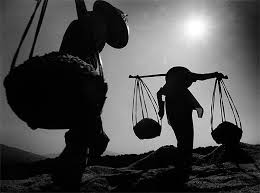burden
英 [ˈbɜː.dən]
美 [ˈbɝː.dən]
- n. 负担;责任;船的载货量
- vt. 使负担;烦扰;装货于
- n. (Burden)人名;(英)伯登
使用频率:

记忆方法
将“burden”与“bur”的沉重感联系起来,想象一只沉重的包裹(burden)压在肩上(bur),这样可以帮助记忆单词的意思是负担或重担。
以上内容由AI生成, 仅供参考和借鉴
中文词源
burden 重担
来自bear, 承担,承载。
英语词源
- burden
-
burden: There are two distinct words burden in English. By far the older, ‘load’, comes from Old English byrthen. Like bear, birth, bairn, bier, barrow, and berth it goes back ultimately to an Indo-European base *bher-, which signified both ‘carry’ and ‘give birth’. Its immediate Germanic ancestor was *burthi-, which also gave German bürde ‘load’. The other burden, ‘refrain’, and hence ‘main theme’, is an alteration of an earlier bourdon [14], which was borrowed from Old French bourdon ‘bass pipe’.
=> bairn, barrow, bear, berth, bier, birth - burden (n.1)
- "a load," Old English byrðen "a load, weight, charge, duty;" also "a child;" from Proto-Germanic *burthinjo- "that which is borne" (cognates: Old Norse byrðr, Old Saxon burthinnia, German bürde, Gothic baurþei), from PIE root *bher- (1) "to bear, to carry; give birth" (see infer).
The shift from -th- to -d- took place beginning 12c. (compare murder (n.), rudder). Archaic burthen is occasionally retained for the specific sense of "capacity of a ship." Burden of proof is recorded from 1590s. - burden (n.2)
- "leading idea," 1640s, a figurative use from earlier sense "refrain or chorus of a song," 1590s, originally "bass accompaniment to music" (late 14c.), from Old French bordon "bumble-bee, drone," or directly from Medieval Latin burdonom "drone, drone bass" (source of French bourdon, Spanish bordon, Portuguese bordão, Italian bordone), of echoic origin.
权威例句
- 1. I wouldn't call it a burden; I call it a responsibility.
- 我不觉得这是负担;我觉得它是一种责任。
- 2. The developing countries bear the burden of an enormous external debt.
- 发展中国家背负着巨额外债。
- 3. A vastly disproportionate burden falls on women for child care.
- 照料孩子的重担落在了女性身上。
- 4. Her death will be an impossible burden on Paul.
- 她的去世将给保罗带来难以承受的打击。
- 5. His business empire collapsed under a massive burden of debt.
- 他的商业帝国无力承担沉重的债务负担而垮掉了。